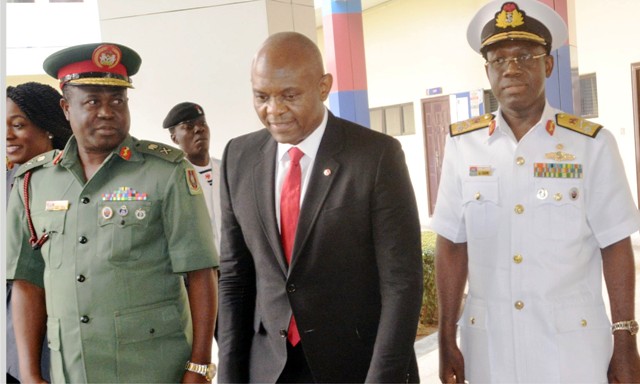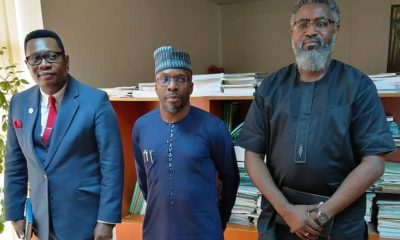Business
Renewable Energy: Why Africa Must Improve Transmission Grid –Fashola
The Minister of Power, Works and Housing, Mr Babatunde Fashola has said Africa must intensify efforts at improving transmission grid for renewable energy to be effectively developed on the continent.
The Minister spoke last Monday at the opening of a two- day Conference on Renewable Energy Development organised by the Centre for Petroleum, Energy Economics and Law (CEPEEL ) of the University of Ibadan.
The theme of the conference is “ Developing Renewable Energy in Africa; The interplay of Technology, Economics and Law.’’
Represented by the Director of Renewable and Rural Power Access Department in the ministry, Farouk Yusuf, the minister said Nigeria as a committed member of both the United Nations, African Union and ECOWAS has adopted several international treaties and policies which promote the use of renewable energy.
This, he said, was in line with the national vision to provide incremental power, and then steady and uninterrupted power.
The minister said that the Federal Government recently approved an integrated energy MIX targets under Electricity Vision 30:30:30 which targets generation of 30 GW in year 2030, with 30 per cent from renewable energy sources.
“Africa has trillions standard cubic feet of natural gas reserves, billions of barrels of crude oil reserves and billions of tonnes of coal.
“But Africa has even greater abundance of renewable energy resources. Unfortunately, of the nearly 1.5 billion people estimated to lack electricity supply world over, half live in Africa.
“ Nigeria alone is estimated to have over 90 million people living without electricity supply, according to the World Bank,’’ he said.
The minister, who also said that power generation capacity in the country currently is about 7000 MW, added that government was making efforts to complete and inaugurate some renewable energy projects.
He listed the projects to include the 10 MW Katsina wind farm, 30 MW Gurara Hydro Power, 29 MW Dadin Kowa Hydro Power and 40 MW Kashimbilla Hydro Power.
The minister further disclosed that large projects such as the 3050 MW Mambilla Hydro Power and 700 MW Zungeru Hydro power initiatives as well as the 14 Solar IPPs were expected to come on stream.
Gov. Abiola Ajimobi, while declaring the conference open, said Nigeria needed to allocate huge funds to renewable energy development in Africa
Represented by his Chief of Staff, Gbade Ojo, the governor said African countries must set their minds to improving the level of energy efficiency that would enable the country to meet the Sustainable Development Goals.
“ Then we must propel our ship to move at full speed in proactive solution for scaling up renewable energy, “ he said.
The Vice-Chancellor of the University of Ibadan, Prof. Idowu Olayinka, said that the theme was relevant and critical given the current energy challenges.
“ The significance is not just for the town but also for the gown as the university spends very considerable amount of money to ensure stable electricity supply that can support research, training and other activities,’’ he said.
The Director of the centre, Prof. Adeola Adenikinju, said that the provision of energy infrastructure engenders a multidisciplinary perspectives to solve energy challenges.
According to him, a multidisciplinary approach is needed for providing adequate and reliable energy infrastructure.
Business
Insecurity, Poor Power Supply Hamper Business Activities – Survey

Business in Nigeria remain under pressure as a result of insecurity and erratic power supply which continue to stifle productivity in the country.
This is even as new data from the Central Bank of Nigeria (CBN) indicate sustained improvements in economic activity.
This was the response of businesses in the CBN’s October 2025 Business Expectations Survey (BES) and the Purchasing Managers’ Index (PMI) report.
While the PMI showed that economic activity expanded for the 11th consecutive month, the BES revealed that businesses are still grappling with crippling operational constraints that threaten to reverse recent macroeconomic gains.
According to the BES conducted between October 6 and 10, firms identified insecurity (71.8 points) as the most critical challenge affecting operations nationwide. This was closely followed by insufficient power supply (70.9 points), multiple taxation (70.2 points), high interest rates (68.4 points) and financial constraints (65.6 points). Analysts say these constraints underscore the depth of structural weaknesses confronting Nigeria’s private sector.
Despite these challenges, the survey reported a rise in business optimism. The Business Confidence Index increased to 38.5 points in October from 31.5 in September. Firms also projected confidence levels to reach 45.6 points in November, with expectations of further improvement over the next three to six months.
However, sector analysts warn that the optimism remains fragile due to the lack of significant improvements in the operating environment.
The BES further showed a modest rise in capacity utilisation from 60.4% in September to 62.0% in October, suggesting that businesses have yet to deploy their productive capacity amid ongoing disruptions fully.
In contrast to the structural constraints highlighted in the BES, the PMI report indicated strengthening economic momentum. The composite PMI rose to 55.4 points, reflecting expansion across major components such as output, new orders, employment, inventories, and supplier delivery times.
A sectoral breakdown showed that the agriculture sector recorded the most substantial improvement, with its PMI climbing to 57.5 points, marking 15 consecutive months of expansion. The services sector also expanded for the ninth straight month to 55.6 points, while the industry sector rose to 54.2 points, the highest in more than a year.
The CBN attributed the positive trends to improvements in the broader macroeconomic landscape, including declining inflation, which eased from 24.5% in January to 18.0% in September, and the year-to-date appreciation of the naira across both official and parallel markets.
The BES showed that the North-East posted the highest business confidence at 56.1 points, while the South-South recorded the lowest at 23.3 points, a trend linked to declining activity in oil-producing communities.
Business
FG Set To Launch Free National Financial Literacy Training For 100,000 Youths,
The Federal Government will on Tuesday, November 25, officially unveil a strategic programme for a free nationwide training of over 100,000 youth on financial literacy.
The Federal Ministry of Youth Development will launch the programme in collaboration with Investonaire Academy. Tagged, the “Financial Literacy, Investment, and Wealth Creation programme.”
The flagship initiative is designed to equip young Nigerians with essential financial skills, investment knowledge, and digital competencies for sustainable wealth creation.
A statement signed by the Director, Press and Public Relations, Federal Ministry of Youth Development, Omolara Esan, and made available to newsmen, confirmed that the launch of the programme, to be held in Abuja, would promote nationwide participation.
It added that the launch would bring together senior government officials, development partners, private sector leaders, and youth representatives to explore innovative approaches for improving financial capability and strengthening the economic prospects of young Nigerians.
Minister of Youth Development, Comrade Ayodele Olawande, would serve as the chief host, while the Minister of Women Affairs, Hajiya Imaan Sulaiman-Ibrahim, would grace the event as the Special Guest of Honour.
Also expected are representatives of key government institutions and private sector partners, including Dr Enefola Odiba, International Programme Director, Investonaire Academy, and Mr. Bashir Nurmohamed, Chief Executive Officer, Hantec Markets
The statement reads, “A major highlight of the event will be the unveiling of a free national financial literacy training programme targeting over 100,000 youths annually. The programme will be powered by a state-of-the-art Learning Management System (LMS) designed to enhance financial intelligence, investment capacity, and entrepreneurial readiness among Nigerian youth.
Lady Godknows Ogbulu
Business
‘Entrepreneurs, Not Foreign Aid Drive Nigeria’s Growth’

The chairman of the United Bank for Africa, Tony Elumelu, says Nigeria’s economic transformation will be driven by entrepreneurs, not government handouts or foreign assistance.
Elumelu, who spoke at the Grow Nigeria Conference 2.0 and themed ‘Empowering Nigeria’s Entrepreneurs: Building Institutions That Last’, in Lagos, Monday, said the nation’s future is already being shaped by business owners who refuse to settle for mediocrity.
Elumelu, who is also the founder of the Tony Elumelu Foundation, described Nigeria as an entrepreneurial nation but stressed the need to build institutions that can stand the test of time.
“Starting businesses is good. Sustaining them is critical, and that’s how we transform this economy,” he said.
He noted that many promising ideas fail because the systems and support structures necessary for growth are absent.
According to him, Nigeria’s renewal must come from the private sector, backed by strong governance frameworks and proper succession planning.
“Nigeria will not be built by government handouts or foreign aid. Government’s role is critical, but Nigeria will be built by entrepreneurs — by you, building businesses that create jobs, hope, and prosperity from the ground up,” he said.
Elumelu, however, emphasized that entrepreneurs cannot succeed in isolation.
“You need frameworks — clear governance, succession planning, and relentless focus on value. We need the right environment. We need a Nigeria where policies are predictable, infrastructure works, and financing is truly accessible,” he said.
He called for stronger alignment between public and private sector efforts, warning that progress would remain limited if institutions work independently rather than collaboratively.
Elumelu commended the Director-General of the Small and Medium Enterprises Development Agency of Nigeria (SMEDAN), Charles Odii, for ongoing reforms within the agency.
He further lauded President Bola Tinubu for appointing young Nigerians to lead key institutions and for prioritizing youth entrepreneurship.
“Let us cut the bureaucracy. Make finance and opportunity real, not theoretical. Let’s help Nigeria’s entrepreneurs move from surviving to winning.
“Every job we create fights insecurity. Every thriving business increases our tax base and accelerates prosperity for all,” Elumelu added.
-
Sports3 days ago
170 cycling challenge to make Lagos global hub for sports tourism
-

 Business2 days ago
Business2 days agoNigeria’s Inflation Rate Eases To 16.05% – NBS
-

 News3 days ago
News3 days agoNSCDC Arrests 20 Suspects For Alleged Threat To National Security
-
Health2 days ago
Police Hospital Reports More Malaria Incidence
-
Politics2 days ago
Kebbi Schoolgirls’ Abduction Tragic, Unacceptable – Northern Govs
-
News2 days ago
Kalabaris Celebrate New Year Amid Fanfare
-
Sports3 days ago
Winners emerge at TotalEnergies charity golf tourney
-

 Business2 days ago
Business2 days ago‘Entrepreneurs, Not Foreign Aid Drive Nigeria’s Growth’

